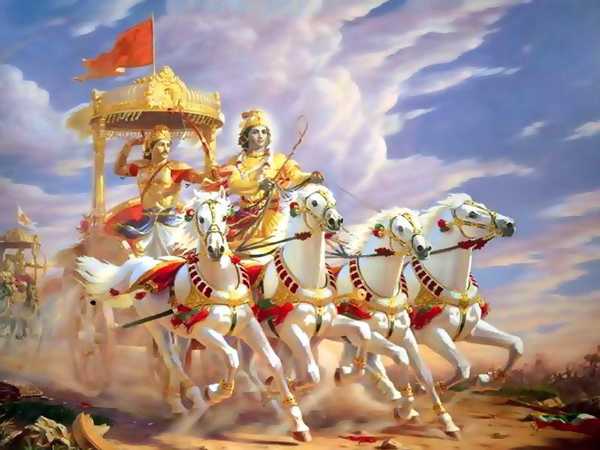Chapter 22

“Krishna said,–‘O thou of mighty arms, there is a certain person of thehead of a (royal) line who upholdeth the dignity of his race At hiscommand have we come against thee. Thou hast brought, O king, many of theKshatriyas of the world as captives (to thy city.) Having perpetratedthat wicked wrong how dost thou regard thyself as innocent? O best ofmonarchs, how can a king act wrongfully towards other virtuous kings? Butthou, O king, treating other kings with cruelty, seekest to offer them assacrifice unto the god Rudra! O son of Vrihadratha, this sin committed bythee may touch even us, for as we are virtuous in our practices, we arecapable of protecting virtue. The slaughter of human being as sacrificeunto the gods is never seen. Why dost thou, therefore, seek to perform asacrifice unto god Sankara by slaughtering human beings? Thou artaddressing persons belonging to thy own order as animals (fit forsacrifice)! Fool as thou art, who else, O Jarasandha, is capable ofbehaving in this way? One always obtaineth the fruits of whatever actsone performeth under whatever circumstances. Therefore, desirous as weare of helping all distressed people, we have, for the prosperity of ourrace, come hither to slay thee, the slaughterer of our relatives. Thouthinkest that there is no man among the Kshatriyas (equal to thee). This,O king, is a great error of judgment on thy part. What Kshatriya isthere, O king, who endued with greatness of soul and recollecting thedignity of his own parentage, would not ascend to eternal heaven thathath not its like anywhere, falling in open fight? Know O bull among men,that Kshatriyas engage themselves in battle, as persons installed insacrifices, with heaven in view, and vanquish the whole world! Study ofthe Vedas, great fame, ascetic penances, and death in battle, are allacts that lead to heaven. The attainment of heaven by the three otheracts may be uncertain, but death in battle hath that for its certainconsequence. Death in battle is the sure cause of triumph like Indra’s.It is graced by numerous merits. It is for this reason that he of ahundred sacrifices (Indra) hath become what he is, and by vanquishing theAsuras he ruleth the universe. Hostility with whom else than thee is sosure of leading to heaven, proud as thou art of the excessive strength ofthy vast Magadha host? Don’t disregard others, O king. Valour dwelleth inevery man. O king of men, there are many men whose valour may be equal orsuperior to thine. As long as these are not known, so long only art thounoted for thy valour. Thy prowess, O king, can be borne by us. It is,therefore, that I say so. O king of Magadha, cast off thy superiority andpride in the presence of those that are thy equals. Go not, O king, withthy children and ministers and army, into the regions of Yama.Damvodhava, Kartavirya, Uttara, and Vrihadratha, were kings that met withdestruction, along with all their forces, for having disregarded theirsuperiors. Desirous of liberating the captive monarchs from thee, knowthat we are certainly not Brahmanas. I am Hrishesha otherwise calledSauri, and these two heroes among men are the sons of Pandu. O king ofMagadha, we challenge thee. Fight standing before us. Either set free allthe monarchs, or go thou to the abode of Yama.
“Jarasandha said,–‘I never make a captive of a king without firstvanquishing him. Who hath been kept here that hath not been defeated inwar? This, O Krishna, it hath been said, is the duty that should befollowed by the Kshatriyas, viz., to bring others under sway by theexhibition of prowess and then to treat them as slaves. Having gatheredthese monarchs with the intention of offering them as sacrifices unto thegod, how shall I, O Krishna, from fear liberate them to-day, when Irecollect also the duty I have recited of a Kshatriya? With troopsagainst troops arrayed in order of battle, or alone against one, oragainst two, or against three, at the same time or separately, I am readyto fight.'”
Vaisampayana said,–“Having spoken thus, and desiring to fight with thoseheroes of terrible achievements, king Jarasandha ordered (his son)Sahadeva to be installed on the throne. Then, O bull of the Bharata race,the king, on the eve of battle, thought of his two generals Kausika andChitrasena. These two, O king, were formerly called by everybody in theworld of men by the respectful appellations of Hansa and Dimvaka. And, Omonarch, that tiger among men, the lord Sauri ever devoted to truth, theslayer of Madhu, the younger brother of Haladhara, the foremost of allpersons having their senses under complete control, keeping in view thecommand of Brahma and remembering that the ruler of Magadha was destinedto be slain in battle by Bhima and not by the descendant of Madhu(Yadavas), desired not to slay himself king Jarasandha, that foremost ofall men endued with strength, that hero possessed of the prowess of atiger, that warrior of terrible valour.”




